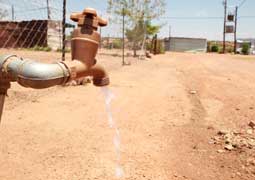
Giving the context to her department’s Budget Vote at the National Council of Provinces, the Minister of Water and Sanitation, Ms Nomvula Mokonyane, stated that the budget is based on the fundamental priorities of providing water and decent sanitation to all. The department is guided by the mantra: “Water is life and sanitation is dignity.”
To realise this mantra, she said, her department is in the process of reviewing water sector institutions as envisaged by the National Development Plan. “This includes, amongst others, the establishment of the National Water and Sanitation Infrastructure Agency, and the realignment of water boards in various provinces to expand their expertise to reticulate base and hasten service delivery. This is to guarantee sustainable water supply and decent sanitation delivery to our people.”
Part of the department’s mandate is to deliver bulk water to municipalities, which are mandated to reticulate it to their respective jurisdictions, she said. However, often municipalities fail to undertake this task. “Municipalities have either failed to invest adequately in reticulation infrastructure and or failed to operate and maintain such infrastructure, where it exists, optimally,” she said.
The budget was presented against the backdrop of a devastating drought, with currently, the Western Cape the worst hit, with dam levels at the all-time low. “The promotion of re-use technologies and rain-water harvesting form part of the interventions to save the Western Cape situation. We will also draw experiences from the Richards Bay Desalination Plan to consider similar plan in the Western Cape,” she said.
Water security remains critical for economic and social development, she said. As such, there are key augmentation schemes to support water security. “The raising of the Clanwilliam dam wall and irrigation scheme in the Western Cape is meant to increase water storage capacity for emerging black farmers to unleash their economic potential. The total infrastructure budget of R9.8 billion will be invested in water security initiatives across the country.”
NCOP permanent delegate Ms Landulile Dlamini agreed, but emphasised that water is a human rights issue. “As much as the lack of available bulk water is a constraint to economic development, it is also a basic human right that can guarantee human dignity.” The department has made significant inroads in this regard and has abided by the National Development Plan that associates the augmentation of water resources infrastructure with job creation and economic development, she said.
“The expectation is for the sector to contribute to the creation of 11 million jobs by 2030, providing basic services to rural communities to increase their capabilities and thus take advantage of economic opportunities as well as professionalised public service with high calibre candidates.”
NCOP permanent delegate Ms Delisile Ngwenya said that, currently, there is no science applied to the manufacture water. We rely primarily on rain and our water sources are threatened by developments that are not environmentally friendly, she said. “Currently, there is no science to manufacture water. We depend primarily on rain and the capacity of our ecosystem to store and reticulate water. Also, our rivers, wetlands and grasslands face unprecedented threats from developments that would in normal societies not get environmental authorisation,” Ms Ngwenya said.
Sadly, 23 years into our democracy South Africans are still subjected to the bucket system, said Ms Matlhodi Maseko in the Western Cape provincial administration. “How is it allowed that 23 years into our democracy this undignified system is still operational in 45 out of the country’s 278 municipalities?”
The development of a Water and Sanitation Framework will ensure that existing policies are consolidated into a single, cohesive policy to guide the sector, said permanent NCOP delegate Ms Lungelwa Zwane. “This will ensure that the role and responsibilities of role players across the three spheres of government are clarified, including those of the water management institutions. This will ensure the facilitation of an enhanced cooperation and collaboration in the rollout of bulk water resources, water supply and sanitation services.”
We wish the department, in collaboration with South African Local Government Association, to spearhead a discussion with the National Treasury on the exploration of revenue management, appropriation of tariff setting, regular billing and effective collection systems, said Councillor Mr Thulani Stemele.
We are also concerned by the escalation of debt owed by municipalities to water boards in the same way we are concerned by the debt owed to municipalities by communities, he added.
Abel Mputing
23 June 2017

